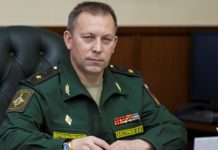Vladislav Kulikov
Rossiyskaya Gazeta, August 23, 2016, p. 1
The new bill proposes outlining of the notion of a military trauma in the law. Special explanations have to make reception of social aid easier for servicemen and their parents.
IT IS PROPOSED TO OUTLINE THE NOTION OF MILITARY TRAUMA IN THE LAW
The new bill proposes outlining of the notion of a military trauma in the law. Special explanations have to make reception of social aid easier for servicemen and their parents.
Every professional serviceman wants to return from battle alive and intact. But sometimes they have to die. A military contract implies a possible death during fulfillment of a task.
But a serviceman is always convinced that the state will not leave his family in trouble if something happens to him during the service. This is true. But sometimes if a serviceman dies not in a battle but, for example, because of diseases caused by combat wounds or wound that he receives in service his relatives have problems in relations with the authorities.
For state officials death is a legal notion. A serviceman and his relatives should prove that it is a military trauma and not just a trauma that is to blame because servicemen are killed not only by bullets. What if a person damaged his heart during the service? Should infarction of a commander of a regiment who has turned a bad military unit into a perfect one be considered a military trauma?
A separate problem is when a person dies after service. The fate of the compensations depends on the formulations written in the dossier of the retired serviceman. Formulations sometimes let the people down. Doctors sometimes like to write something complicated in their conclusions and state officials draw a conclusion that trauma is not a combat one and this means that a disease is ordinary.
For example, servicemen of units of special risk related to nuclear secrets of the country suffer because of this. Liquidators of consequences of the accidents at the Chernobyl nuclear power station suffer too. If conclusion of experts says that “a disease is caused by radiation and is received during fulfillment of duties of military service with regard to direct participation in actions of units of special risk”, the explanatory note says, state officials do not count this as a military trauma.
Therefore, one of the Federation Council members submitted to the Duma draft amendment to the law on money allowances of servicemen and provision of separate allowances. The document eliminates uncertainties in understanding of a military trauma. Any formulations that connect a disease with military service are equalized to a notion of military trauma. Thus, widows of veterans of military unit will not have to prove that deaths of their husbands were combat ones.
The explanatory note says that there is a paradoxical situation now.
Formulation “military trauma” is indicated, for example, if a serviceman is bitten by a snake at a training range. Of course, this is correct: a person was in service anyway and suffered. But why do state officials stop seeing a military trauma of an officer from units of special risk who die soon after he quits the service although doctors say for sure that the disease has been received during the service?
The explanatory note says, “Along with this, such situation is created not by the legislator because the law does not contain any exceptions for any categories of servicemen who fulfilled duties of military service in some circumstance, this situation is created by those who use the law.” Henceforth, special explanations proposed in the bill should eliminate any doubts of state officials.
According to the law, if a serviceman dies from a military service in a year after he quits the service his family is entitled to compensation of 3 million rubles.
Widows of the serviceman who die in the service are also entitled to monthly monetary compensation after they turn 50 years old.
There are two conditions for appointment of such pension. First, a woman should be married to a serviceman at the moment of his death. This means that if they had been married but divorced the right for pension would be lost. Second, a woman should remain legally member of the family of the serviceman. If she gets married again she is not a member of the family legally already. The right for pension is lost too.














